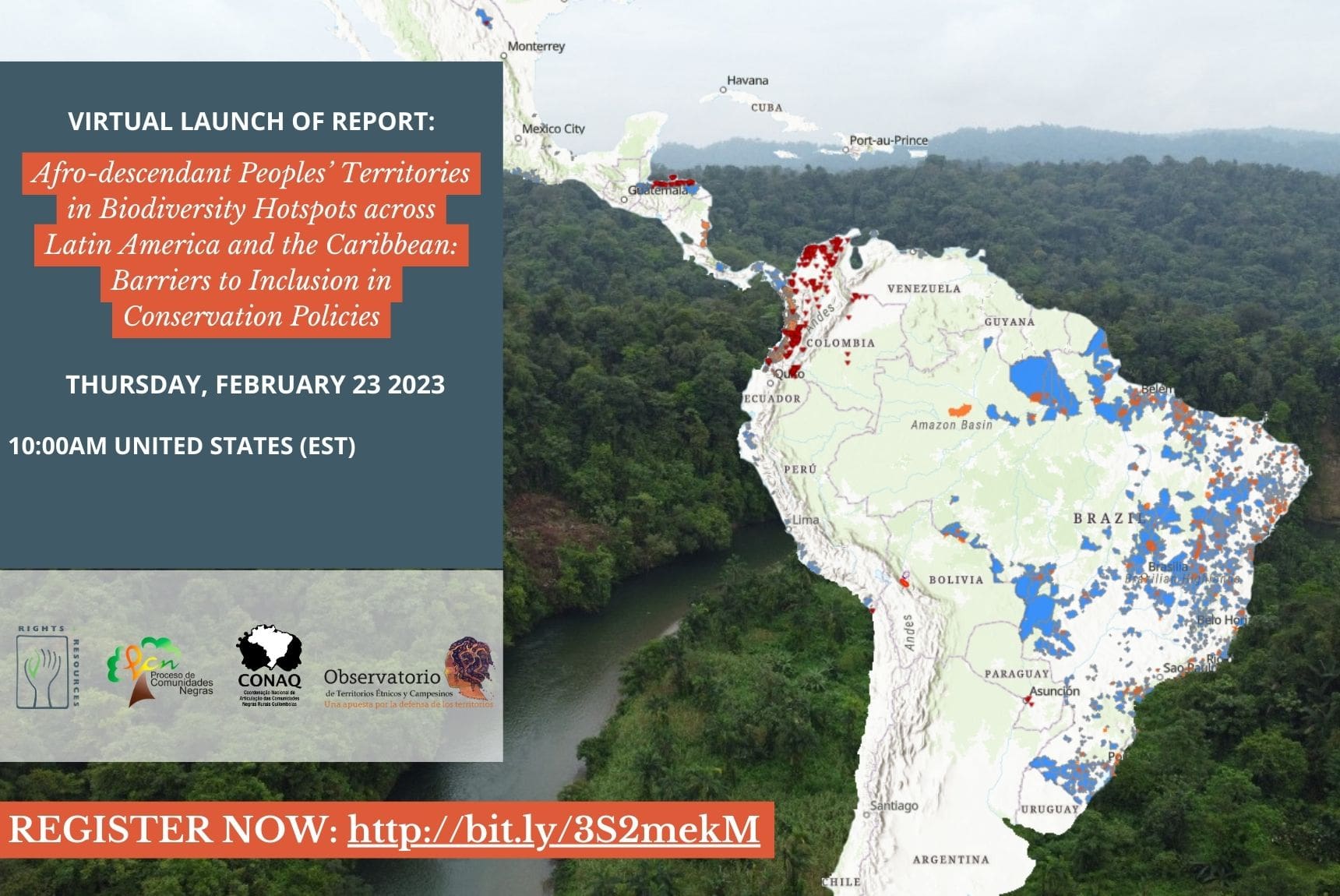Afro-descendant Peoples’ Territories in Biodiversity Hotspots across Latin America and the Caribbean
READ THE REPORTOn February 23, Rights and Resources Initiative (RRI), the Process of Black Communities (PCN) of Colombia, the National Coordination of Articulation of Rural Black Quilombola Communities (CONAQ) of Brazil, and the Pontifical Universidad Javeriana’s Observatory of Ethnic and Campesino Territories (OTEC) of Colombia launched a new study titled, Afro-descendant Peoples’ Territories in Biodiversity Hotspots across Latin America and the Caribbean: Barriers to Inclusion in Conservation Policies.
This new study assesses the opportunities and challenges for the integration of Afro-descendant Peoples’ tenure rights within the conservation policies of 16 countries in the region.
The virtual event launch was held on Thursday, February 23 at 10:00 a.m. EST. A recording of the event in English is now available to watch on our YouTube channel.
Background
The study is Part II of a brief published in October 2022 titled, Mapping the Presence, Lands, and Territories of Afro-descendant Peoples in Latin America and the Caribbean. Part I showcases the results of the cartographic viewer, an innovative tool that—for the first time—displays a geospatial visualization of the territorial presence of Afro-descendant Peoples in the region and their significant relationship with areas of ecological and strategic importance for climate change mitigation.
Part II assesses the land tenure characteristics of the geolocalized territories, each country’s conservation policies as they relate to these spaces, and how Afro-descendant Peoples’ ways and means of life are an effective conservation practice.
Both studies are a result of a collective effort mapping and visualizing the territorial presence of Afro-descendant Peoples in Latin America and the Caribbean. Twenty research groups and Afro-descendant territorial-based organizations from 16 countries in the region participated in the studies.*
*Participants were from Belize, Brazil, Bolivia, Colombia, Chile, Costa Rica, Ecuador, Guatemala, Honduras, Mexico, Nicaragua, Panama, Paraguay, Peru, Suriname, and Venezuela.

Agenda
10:00 – 10:10 a.m. EST — Welcome, opening remarks, and contextual background
- Sonia Vivero Padilla, Coordinator of the Network of Afro-Latin American, Afro-Caribbean, and Diaspora Women (Event Moderator)
- Omaira Bolaños, Director of the Latin America and Gender Justice Programs, Rights and Resources Initiative
- José Luis Rengifo, Territory and Natural Resources Team Coordinator, Process of Black Communities
10:10 – 10:30 a.m. EST — Presentation of the cartographic viewer and report findings
- Johana Herrera, Director of the Observatory of Ethnic and Campesino Communities (OTEC)
- Elias Helo, Researcher and Coordinator of OTEC, Universidad Javeriana
10:30 – 11:15 a.m. EST — Video message from Afro-descendant leaders in Latin America and panel discussion
- John Anton, Institute of Higher National Studies, Ecuador
- Glenda Godfrey Solis, Afro Garifuna Nicaraguan Association, Nicaragua
- Eny Cerón, Process of Black Communities, Colombia
- Jessica Cueto, Afro-Venezuelan KUMbe, Venezuela
- Franciso Das Chagas, National Coordination of Articulation of Rural Black Quilombola Communities, Brazil
11:15 – 11:30 a.m. EST — Q&A and closing remarks
- Katia Penha, National Coordinator of the Articulation of Rural Black Quilombola Communities
